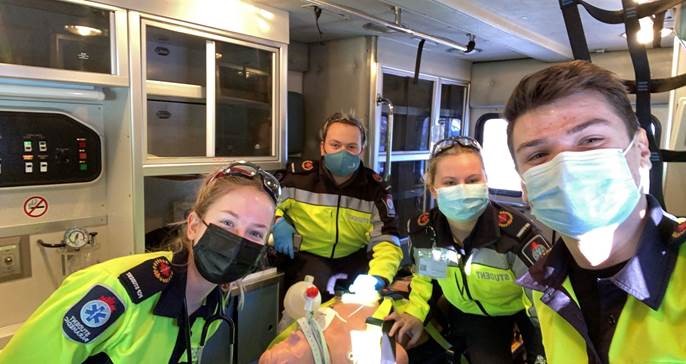Denys Kotelnikov
Primary Care Paramedic
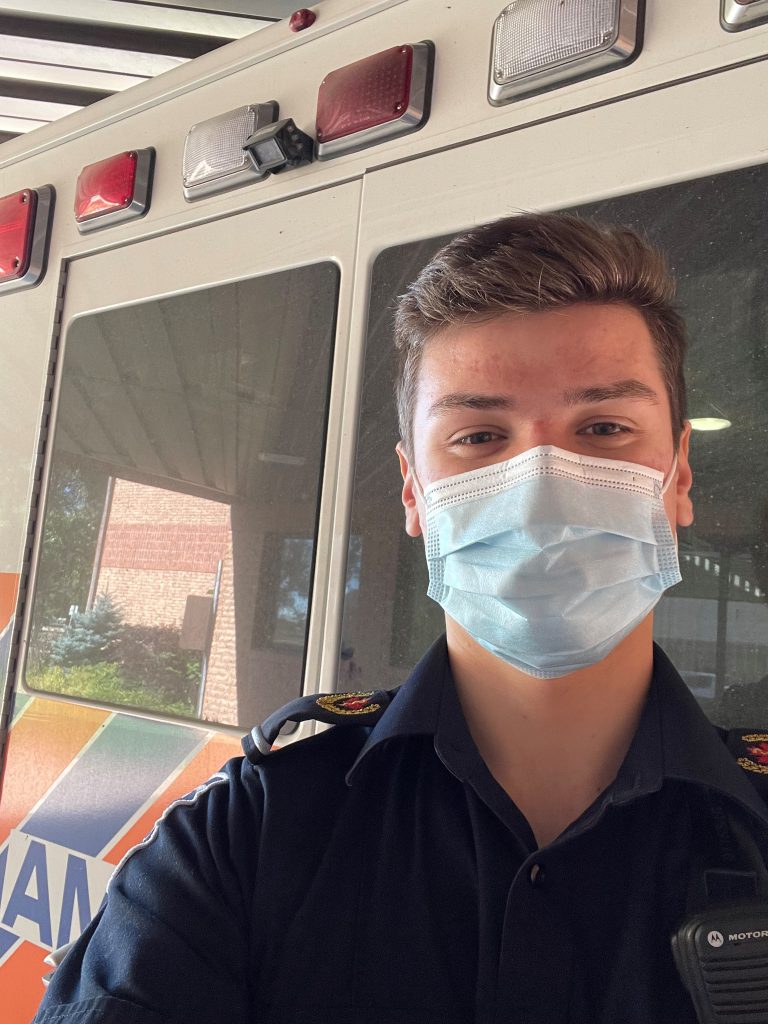
Denys Kotelnikov is a Primary Care Paramedic with the Saskatchewan Health Authority in Watrous, Saskatchewan. Below is his experience working in Emergency Medical Services in the rural community.
What are you responsible for as a Primary Care Paramedic? Can you describe a typical work day?
“I am responsible for responding to emergency calls within the Watrous area as well as transporting patients to different facilities to access care. Example of calls that we respond to range form an elderly person falling over and needing assistance, someone having a heart attack (cardiac arrest), vehicle accidents, workplace accidents, etc. To be honest, there is no such thing as a “typical day” because you never know what might happen during your shift. Depending on the type of call and the volume of calls, you can work a lot of overtime so you need to be in that mindset that emergencies happen at anytime.”
How is your work-life balance as a Primary Care Paramedic? How does it compare with other roles you had in the past?
“Working as Primary Care Paramedic has taken a bit of an adjustment for me. Your shifts are 8 hour days and then you will do cover on-call for 16 hours. My shift rotation is 5 days on and 5 days off then 4 days on and 4 days off. So although that sounds like a good rotation, your days on you need to be able to respond to emergencies on a 24/7 schedule so it makes it difficult to have plans while you are working. While you are on-call, you can go home and go about evening plans but you need to be ready to respond if a call comes in. On the flip side, having 5 or 4 days off in a row makes it easy to plan longer trips. You can also book time off during your rotation to have a even longer break. In terms of comparing my current role to past jobs, I started my career in EMS as an Emergency Medical Responder at the age of 18 and that role was very similar regarding shift work rotations. So I do not have many other jobs that I can compare it with but if you compare a regular Monday to Friday schedule, shift rotation requires a little more planning to reach a stronger work-life balance.”
You mentioned that you work out of the Watrous Hospital during your shift. What else do you do while you wait for calls?
“While waiting for calls there are a number of facility duties that we are responsible for. For example, we will assist with walk-in patients at the emergency departments, start Intravenous (IV) drips, administer medications which provides support to the nurses. Within the SHA and a lot of other smaller rural communities, paramedics do assist with patient care at hospitals which can help keep your skills up to date and add more variety to the day. The opportunity to assist patients in hospitals is not as present in bigger communities so it is a nice perk of rural to have access to a broader scope of practice.”
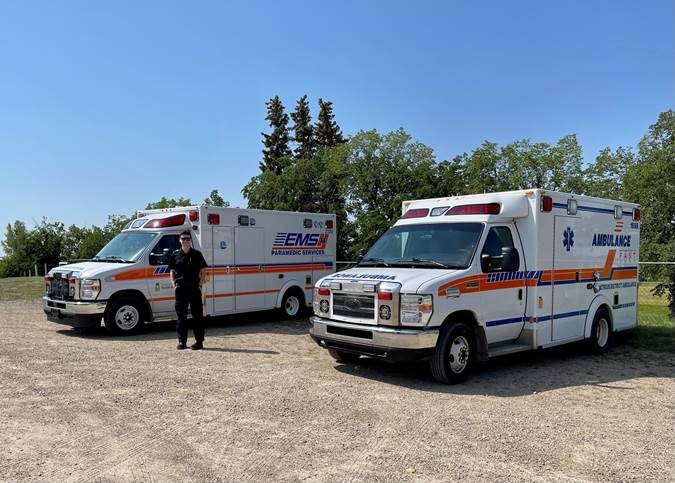
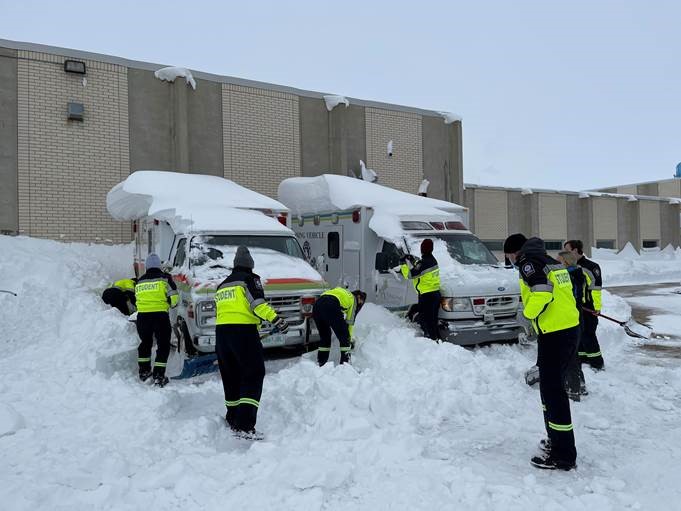
Have you always wanted to be a Paramedic?
“I have always had an interest in emergency services. I remember being a kid and watching the firetrucks go by with their lights flashing and I always thought it was really cool what they were doing and that they were going to respond to an emergency, take control of the situation, and help people. I wanted to put this into practice, so I took my First Aid course at the age of 14, volunteered as much as I could in my community and even went for ride along experiences with emergency professionals to try to learn as much as I could about their roles. The ride-along experiences really helped influence my decision to pursue a career as a paramedic. Watching the paramedics work and take control of crisis situations and help patients was amazing. Another moment that I think can relate to a lot of people is the feeling of helplessness when you see something like a car accident. As a kid, I felt helpless when witnessing situations like that and I hated that feeling. I knew I wanted to be the person that was able to help in emergency situations and so that also influenced my decision.”
How did you join the Saskatchewan Health Authority? Tell us more about your career path.
“I started off as a Emergency Medical Responder with the SHA in Wilkie. After saving some money for school, I started my paramedic training through Saskatchewan Polytechnic in Melville. After receiving my certificate, I started my career in Moose Jaw with a private contracted EMS company and worked there for 6 months. I really wanted to be an SHA employee again so I applied for my current role in Watrous. SHA treated me very well in my first role and I really enjoyed my coworkers, the benefits and vacation packages so I decided to make the change back.”
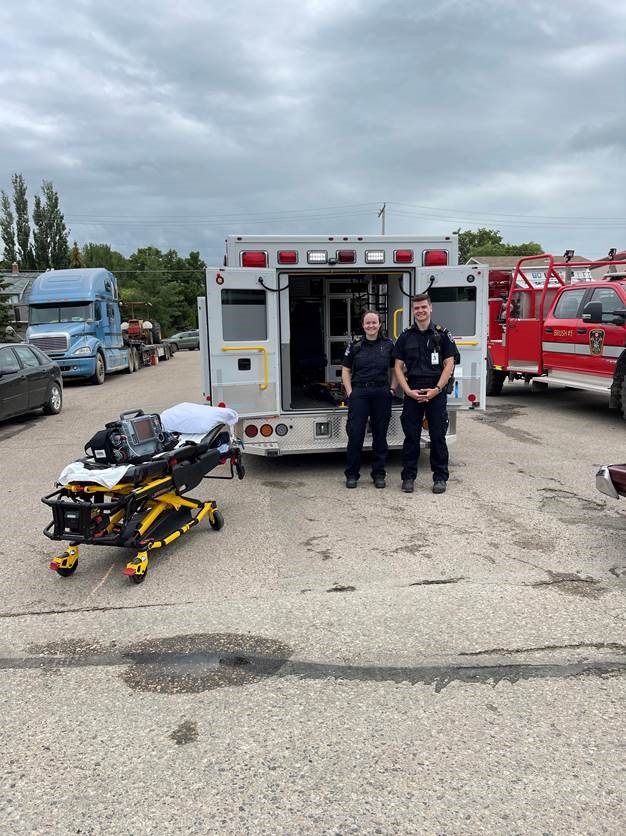
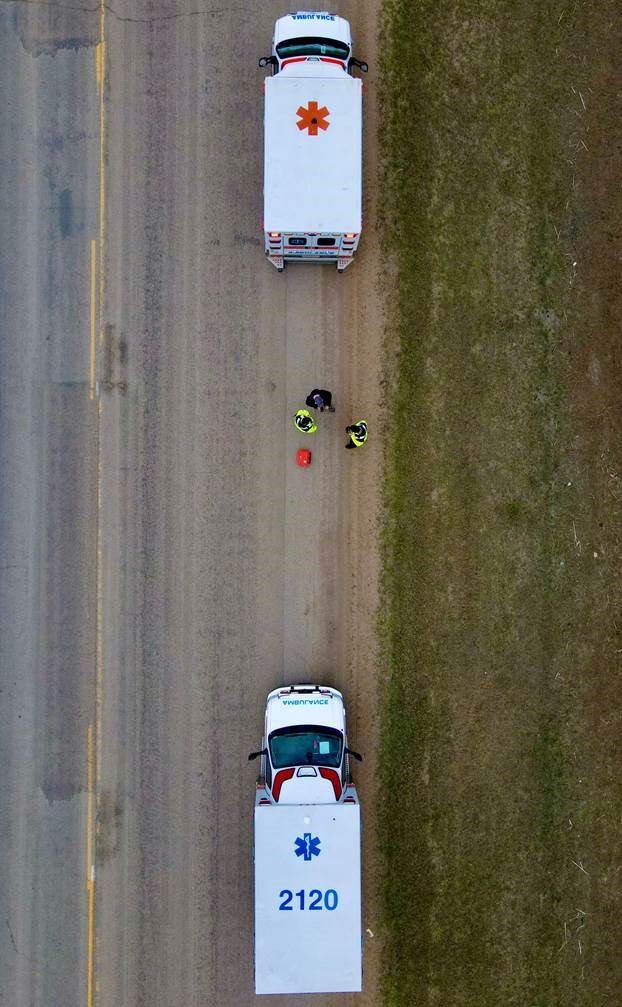
Are there opportunities to further your career with the Saskatchewan Health Authority?
“There are so many opportunities to further your career as a paramedic with the SHA. First of all, there are many opportunities to start of your career off as an Emergency Medical Responder which the requirements do not take that long to get and its great way to test if you want to pursue a career as a paramedic. These opportunities are throughout the province so you have the opportunity to move around if you want. As a Primary Care Paramedic, I can further my education and training to become an Advanced Care Paramedic which broadens my scope of practice and leads to higher wages as well. Beyond wages, advanced paramedics provide services to patients who require a higher level of care and so you can have the opportunity to work in more remote communities, support air ambulance transfers and calls, work in clinics, Intensive Care Unit (ICU) patient transfers, amazing stuff like that. There is also the opportunity work as a Community Paramedic where you provide care in patients homes which can help take the strain off emergency departments and walk in clinics. You can also grow your career by taking on managerial and leadership roles with the SHA. The sky is the limit with this career and it’s fantastic!”
What advice would you give to students looking to pursue a career as a Primary Care Paramedic?
“It can be a a very rewarding career but you do need to keep your body and mind healthy. Paramedics need to be able to work under pressure as we get thrown into high stress and crisis situations. You also need to be able to work independently and as part of a team as communications is very important. Over the past ten years, mental health has become a topic that people are more open to talk about now and so you need to make sure you access resources when you need them as the work you do as paramedic can be very taxing on you. Having a good work ethic and positive attitude will take you far as a paramedic and will open the door for more career opportunities than you will know what to do with. I did my practicum in Meadow Lake which was a great rural experience. Providing emergency services in rural and northern communities can be challenging but you will learn a lot as access to care can be limited which forces you to go above and beyond for your patients. Rural and northern communities also have a lot of opportunities available so you can basically choose where you want to work which is a nice flexibility have.”
What is the number one thing you love about being a Primary Care Paramedic?
“I have always been a people person. I love hearing about patient’s lives and stories and being able to help them the best I can. We get called to some of the worst moments in people’s lives and if I am able to put a smile on their face or take some of that fear and anxiety away even for just a split second, there is no words to describe how good that feels. We also get to bring the emergency room to the patient’s front door where we can provide care for them and there is no other profession out there that can say the same thing. The difference you make in your community, in patients lives are beyond words. I really love it!”
